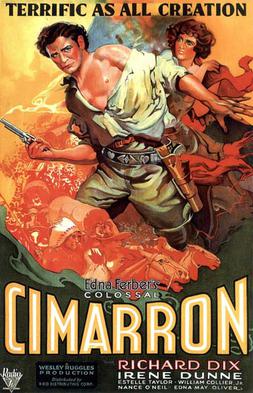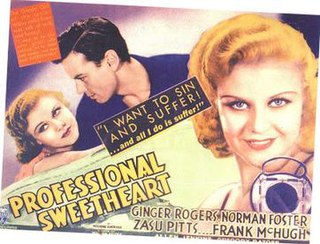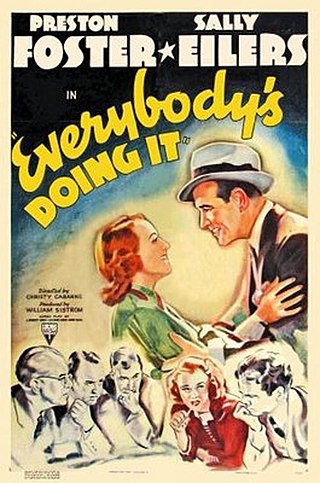
Matthew Reginald Sheffield Cassan was an English-American actor.

Nicholas Musuraca, A.S.C. was a motion-picture cinematographer best remembered for his work at RKO Pictures in the 1940s, including many of Val Lewton's series of B-picture horror films.

Cimarron is a 1931 pre-Code epic Western film starring Richard Dix and Irene Dunne, and directed by Wesley Ruggles. Released by RKO, it won Academy Awards for Best Picture, Best Adapted Screenplay, and Best Production Design.

Sally O'Neil was an American film actress of the 1920s. She appeared in more than 40 films, often with her name above the title.

Marian Marsh was a Trinidad-born American film actress and later an environmentalist.

Bert Lawrence Glennon was an American cinematographer and film director. He directed Syncopation (1929), the first film released by RKO Radio Pictures.

The Vagabond Lover is a 1929 American pre-Code black-and-white musical comedy-drama film about a small-town boy who finds fame and romance when he joins a dance band. The film was directed by Marshall Neilan and is based on the novel of the same name written by James Ashmore Creelman, who also wrote the screenplay. It stars Rudy Vallee, in his first feature film, along with Sally Blane, Marie Dressler and Charles Sellon.

Beau Ideal is a 1931 American pre-Code adventure film directed by Herbert Brenon and released by RKO Radio Pictures. The film was based on the 1927 adventure novel Beau Ideal by P. C. Wren, the third novel in a series of five novels based around the same characters. Brenon had directed the first in the series, Beau Geste, which was a very successful silent film in 1926. The screenplay was adapted from Wren's novel by Paul Schofield, who had also written the screenplay for the 1926 Beau Geste, with contributions from Elizabeth Meehan and Marie Halvey.

The Royal Bed is a 1931 American pre-Code satirical comedy film produced by William LeBaron and distributed through RKO. The film was directed by and starred Lowell Sherman, along with Mary Astor and Anthony Bushell. The screenplay was adapted by J. Walter Ruben based on the 1928 play by Robert E. Sherwood titled The Queen's Husband. It would be one of a handful of RKO pictures which was produced in both English and French language versions.
Edward Frank Dunn was an American actor best known for his roles in comedy films, supporting many comedians such as Charley Chase, Charlie Chaplin, W. C. Fields and Laurel and Hardy.

RKO Radio Pictures Inc., commonly known as RKO Pictures or simply RKO, was an American film production and distribution company, one of the "Big Five" film studios of Hollywood's Golden Age. The business was formed after the Keith-Albee-Orpheum theater chain and Joseph P. Kennedy's Film Booking Offices of America studio were brought together under the control of the Radio Corporation of America (RCA) in October 1928. RCA executive David Sarnoff engineered the merger to create a market for the company's sound-on-film technology, RCA Photophone, and in early 1929 production began under the RKO name. Two years later, another Kennedy concern, the Pathé studio, was folded into the operation. By the mid-1940s, RKO was controlled by investor Floyd Odlum.

Dance Hall is a 1929 American pre-Code musical film directed by Melville Brown and written by Jane Murfin and J. Walter Ruben, based on the short story of the same name by Vina Delmar. The film centers a love triangle with a shipping clerk competing with a dashing aviator for the affections of a young taxi dancer. It was Radio Pictures' second to last release of the decade, and was a critical and financial flop.

Beau Bandit is a 1930 American Pre-Code Western film, directed by Lambert Hillyer, from a screenplay by Wallace Smith, based on his short story, "Strictly Business" which appeared in the April 1929 edition of Hearst's International-Cosmopolitan. The film starred Rod La Rocque, Mitchell Lewis, Doris Kenyon, and Walter Long. The story is based loosely on the legend of Robin Hood.

Beyond Victory is a 1931 American pre-Code war film starring Bill Boyd, James Gleason, Lew Cody, and ZaSu Pitts. While John Robertson received directing credit, Edward H. Griffith supposedly took extensive re-takes after production ended and the film was deemed not audience ready. Two actresses with major roles in the original version were completely cut from the final release, Helen Twelvetrees and June Collyer. The original screenplay was written by Horace Jackson and James Gleason. While the film might not have made a profit at the box office, it was well received by critics.

Professional Sweetheart is a 1933 American pre-Code romantic comedy directed by William A. Seiter from a screenplay by Maurine Watkins. It stars Ginger Rogers in her first film for RKO Radio Pictures, with Norman Foster, ZaSu Pitts and Frank McHugh. The film is a satire of the radio industry; since it is pre-code, Rogers spends some of her time in high heels, stockings, and a slip.

Everybody's Doing It is a 1938 American comedy film directed by Christy Cabanne using a screenplay by J. Robert Bren, Edmund Joseph, and Harry Segall, based on George Beck's story. RKO produced and distributed the film, releasing it on January 14, 1938. The movie stars Preston Foster and Sally Eilers.

Danger Patrol is a 1937 American drama film directed by Lew Landers from a screenplay by Sy Bartlett based on a story by Helen Vreeland and Hilda Vincent. Produced and distributed by RKO Radio Pictures, it was released on December 3, 1937, and stars Sally Eilers, John Beal, and Harry Carey.

Crime Ring is a 1938 American crime drama film directed by Leslie Goodwins from a screenplay by J. Robert Bren and Gladys Atwater, based on a story by Reginald Taviner. The film stars Allan Lane and Frances Mercer, and was produced and distributed by RKO Radio Pictures, released on July 8, 1938.

Lee Marcus, also known as Lee S. Marcus, was an American film producer of the 1930s and 1940s. During his fifteen-year career he produced over 85 films, most of them between 1934 and 1941 while he was at RKO Studios. Prior to his production career, Marcus worked for FBO and then RKO as a sales executive, reaching the level of vice president in both organizations. At RKO, he was head of production of the studio's b-films during the late 1930s and the beginning of the 1940s. He was also responsible for producing what many consider to be the first film noir, 1940's Stranger on the Third Floor.
The Land of Missing Men is a 1930 American pre-Code Western film written and directed by John P. McCarthy – with a script from Bob Quigley – and produced by Trem Carr for his studio Trem Carr Productions. Starring Bob Steele, Al St. John, Eddie Dunn, Caryl Lincoln, Al Jennings and Fern Emmett.



















